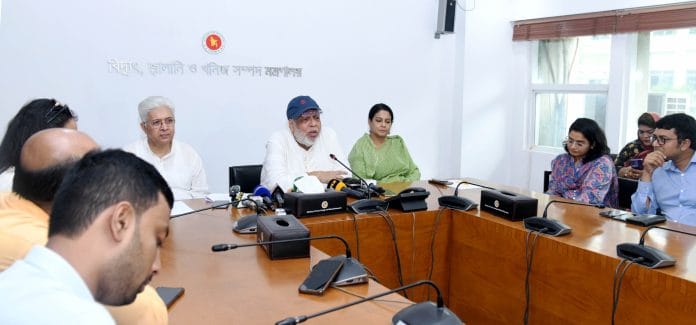Power and Energy Adviser Dr Muhammad Fouzul Kabir Khan on Sunday criticised the ordinance that restructured the National Board of Revenue (NBR), stating that “cunning tactics” were adopted during its drafting.
“There are fundamental flaws in this ordinance,” Khan, also the head of a five-member consultative committee on NBR reforms, told a press conference at the Secretariat.
“For instance, it vaguely states that a ‘suitable person’ will be appointed as secretary of the Revenue Policy Division. Who is this ‘suitable person?’ it can be anybody, but it hasn’t been specified in the ordinance,” he explained.
Khan announced that the ordinance will be revised to address its structural flaws and imbalances between administrative and revenue cadre officials.
“There will be no dominance of either the administration cadre or customs and tax officials in the new structure,” he said. A new policy guideline will be recommended for appointing secretaries and other senior officials in the two newly formed divisions — the Revenue Policy Division and Revenue Administration Division.
The ordinance, issued on May 12, dissolved the National Board of Revenue (NBR) and split it into two separate entities.
This triggered protests by NBR officials, who viewed the changes as undermining their authority.
Khan believes that the ordinance sparked tensions due to long conflicts between officials of admin and other cadres and its quick promulgation.
He said neither the administration cadre nor the customs and tax cadre officers would dominate the new Revenue Policy Division and Revenue Management Division.
He further indicated that a separate policy would be recommended for appointing secretaries and senior officials to these two divisions, establishing clear qualification criteria for these crucial positions.
When asked how the ordinance was passed by the Advisory Council, Khan responded, “We cannot foresee the future. We have our limitations, and that’s why a five-member committee was formed. Everyone makes mistakes — we did too, and now we are correcting them.”
Addressing questions about whether the Anti-Corruption Commission (ACC) was used to suppress the NBR protests, Khan denied any such move. “The ACC was not used. Their process started earlier and is still ongoing. If NBR officials are innocent, the ACC will exonerate them,” he said.
On the lingering fear among NBR staff, Khan stated, “They have lost the government’s trust due to their behavior. To regain that trust, they must increase revenue collection.”
In response to whether the government is reassuring officials, he said, “They are not children. They were initially reassured, yet continued to protest for two months. Is this a marketplace in Khatunganj? They left their duties, caused harm to businesses — who will compensate for that?”
Khan strongly criticized the role of the NBR staff during the protests. “They obstructed revenue collection and took an anti-government stance under the guise of protest. The government showed immense patience,” he said. The committee’s report will soon be submitted to the Finance Advisor.
He added that although NBR officers have suspended their protests, revenue collection remains sluggish. “We will conduct field inspections to assess their current services and collection performance,” he said.
The adviser noted that in his meeting with service provider associations, he stressed the importance of receiving specific recommendations regarding the ordinance, the Rules of Business, and the organogram related to revenue services. He urged stakeholders to share detailed feedback with the committee.
In the same meeting, business representatives emphasized the need for full digitalization of NBR services. They said a smooth and effective digital system is essential for creating a business-friendly environment. Complete digitalization, they noted, would improve transparency, increase accountability, and make business processes easier and more time-efficient.
When asked about uncertainty among businesses regarding U.S. tariffs under the Trump-era policy, Khan said there’s no reason for businesses to be in the dark. “We have held discussions with top business leaders. The current dialogue with the U.S. goes beyond trade and tariffs — it involves national security and foreign policy dynamics as well.”
The press conference was also attended by Public Works Advisor Adilur Rahman Khan and Environment Advisor Syeda Rizwana Hasan.

